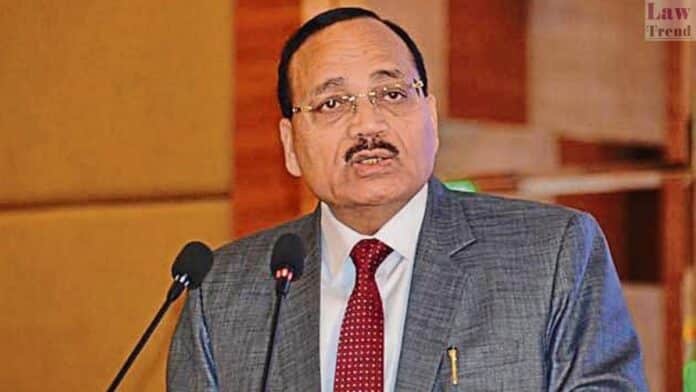Chief Justice of India-designate Justice Surya Kant on Sunday said that while India’s judiciary is actively exploring artificial intelligence for research, transcription, and data analytics, technology must serve as an aid — not a substitute — for human discernment and ethical reasoning.
Speaking at the valedictory session of the Sixth Full Meeting of the Standing International Forum of Commercial Courts (SIFoCC) in New Delhi, Justice Kant underscored that “the law is not a mere algorithm — it is a reflection of human conscience, shaped by empathy, moral reasoning, and an understanding of context that machines cannot replicate.”
AI as a Tool, Not a Substitute
Justice Kant observed that the judiciary in India has already begun integrating AI tools for judicial processes but stressed the need to preserve human oversight.
“In India too, the judiciary has begun exploring AI-based tools for research, transcription, and data analytics, always with the guiding principle that technology must augment, not replace, the human mind’s discernment,” he said.
Raising critical ethical questions on automation, he asked, “Can an algorithm trained on imperfect data truly deliver impartial justice? Who bears responsibility when automated systems err or perpetuate systemic bias?”
He emphasised that the future of law depends on “whether we can harness technology as a tool without surrendering the humanity that gives justice its moral core.”
Judicial Legitimacy and Transparency
Justice Kant highlighted that the credibility of courts rests not only on correct outcomes but also on the perceived fairness of the process. Citing reforms in India’s justice system, he referred to initiatives such as live-streaming of proceedings, real-time publication of judgments, and a national digital case management system linking all levels of courts.
“The legitimacy of judicial institutions depends not only on the correctness of outcomes but also on the perceived fairness of the process,” he remarked.
Strengthening Commercial Adjudication
Reflecting on India’s progress in commercial justice, Justice Kant said hosting the SIFoCC meeting was a moment of pride and introspection. “We have established dedicated commercial courts across the country; introduced random and automatic allocation of cases, pre-trial conferences, and case-management hearings to eliminate delays,” he noted.
He pointed out that under the e-Courts Phase III programme — with a budgetary allocation of ₹7,210 crore — India is moving towards a unified, cloud-based “smart judicial ecosystem” enabled by AI, machine learning, and blockchain infrastructure.
“Through these modernising efforts, India is not only expediting justice but reinforcing the trust of investors, businesses, and citizens in the reliability, predictability, and integrity of our judicial processes,” he said.
Global Cooperation Through SIFoCC
Justice Kant lauded the presence of around sixty jurisdictions at the forum, calling SIFoCC a “bridge between legal systems and a beacon for global judicial cooperation.” He noted that proposals to improve enforcement of arbitration awards and mediation agreements symbolise a shared global commitment to fairness and commercial trust.
“Commercial law, at its core, is a law of promises — and trust is its currency,” he remarked, adding that SIFoCC reflects the common dedication of diverse legal systems to justice and rule of law.
Ethics, Sustainability, and the Future of Law
Justice Kant, who will assume office as the next Chief Justice of India on November 24, also drew attention to the growing responsibility of courts in balancing economic progress with environmental sustainability.
“In India, this balance is deeply enshrined in the constitutional vision — where the right to carry on trade and the right to a clean environment coexist as complementary, not competing, entitlements,” he said.
Concluding his address, he reiterated India’s commitment to contributing actively to the global conversation on commercial justice, grounded in ethics, trust, and technological responsibility.




